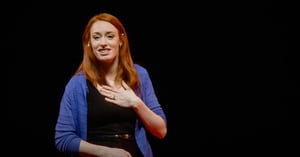“I believe that mathematics is so powerful that it has the potential to offer us a new way of looking at almost anything. Even something as mysterious as love”.
This is the belief expressed by Hannah Fry, a researcher of Mathematics and the Theory of Complexity at the Centre for Advanced Spatial Analysis at University College London, and author of the book, “The Mathematics of Love”.
But what is this belief based on?
She gives an initial explanation at the beginning of this TED Talk:
“Human emotion isn’t neatly ordered and rational and easily predictable. But I also know that that doesn’t mean that mathematics hasn’t got something that it can offer us, because, love, as with most of life, is full of patterns and mathematics is, ultimately, all about the study of patterns”.
The idea, therefore, is to identify the repetition or recurrence of a series of situations and then analyze them by applying statistical models and scientific calculations.
For example: what makes you popular on an online dating website is not minimizing the aspects that some people may find unattractive, but rather dividing opinion and making sure that you make yourself attractive to those that fancy you. This is an ingenious application of the game theory, which maximizes our possibilities to win over the people we like.
And also: how do we know when the time has come to settle down and choose our ideal partner? Simple – by using a mathematical tool, “the optimal stopping theory”, which essentially replicates a mechanism proven in nature:
“There are certain types of fish which follow and employ this exact strategy. So they reject every possible suitor that turns up in the first 37 percent of the mating season, and then they pick the next fish that comes along after that window that’s, I don’t know, bigger and burlier than all of the fish that they’ve seen before. I also think that subconsciously, humans, we do sort of do this anyway. We give ourselves a little bit of time to play the field, get a feel for the marketplace or whatever when we’re young. And then we only start looking seriously at potential marriage candidates once we hit our mid-to-late 20s”.
However, perhaps the most surprising piece of advice offered by Hannah Fry is her third one on how to avoid divorce.
It stems from a survey by the psychologist John Gottman, who, together with his colleagues, observed hundreds of couples having a conversation and was able to predict whether a given couple was going to get divorced in the future with a 90 percent accuracy.
How did he do it? He recorded everything: what was said during the conversation, the couple’s skin conductivity, their facial expressions, their heart rates and their blood pressure. And then he applied the equations of a mathematician, James Murray, to understand what caused the “negativity spirals” in the conversation and how they occurred. These equations depend on the mood of the person when they are on their own, the mood of the person when they are with their partner, but most importantly, they depend on how much the husband and wife influence one another.
The final result was surprising:
“I always thought that good marriages were about compromise and understanding and allowing the person to have the space to be themselves. So I would have thought that perhaps the most successful relationships were ones where there was a really high negativity threshold. Where couples let things go and only brought things up if they really were a big deal. But actually, the mathematics and subsequent findings by the team have shown the exact opposite is true”.
It seems that the best couples are those that discuss everything and allow each other some room to complain, those that continually try to “repair their relationship” without letting trivial things effect them.
These quick-witted considerations – which are especially appreciated as they play with science without rejecting its credibility – help us to understand that mathematics is very useful not only for understanding how nature works, but also for describing and predicting the complex mechanisms of human relationships. Provided that you have a well-trained eye, an open mind and a great sense of humor. Just like Hannah Fry.

